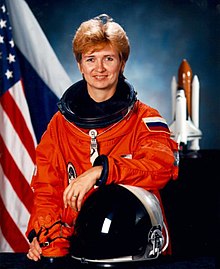Jelena Wladimirowna Kondakowa
| Jelena Kondakowa | |
|---|---|
 | |
| Land | Russland |
| ausgewählt | 25. Januar 1989 |
| Einsätze | 2 Raumflüge |
| Start des ersten Raumflugs | 3. Oktober 1995 |
| Landung des letzten Raumflugs | 25. Mai 1997 |
| Zeit im Weltraum | 178d 10h 41min |
| ausgeschieden | 30. Dezember 1999 |
| Raumflüge | |
| |
Jelena Wladimirowna Kondakowa (russisch Елена Владимировна Кондакова; * 30. März 1957 in Mytischtschi bei Moskau, Russische SFSR) ist eine ehemalige russische Kosmonautin.
Leben
Sie war bei ihrem Start mit Sojus TM-20 die dritte sowjetische bzw. russische Frau im Weltall und die erste Frau überhaupt, die an einer Langzeitmission teilnahm. 1997 startete sie noch einmal mit STS-84 ins All. Sie verbrachte während ihrer Missionen insgesamt 178 Tage, 10 Stunden und 41 Minuten im All.
Von 1999 bis 2011 war Kondakowa Abgeordnete der russischen Duma. Seit 2012 ist sie Handelsvertreterin Russlands in der Schweiz.[1]
Privates
Kondakowa war von 1985 bis zu seinem Tod 2022 mit dem Kosmonauten Waleri Rjumin verheiratet. Die beiden haben eine gemeinsame Tochter, Rjumin brachte zwei weitere Kinder mit in die Ehe.
Siehe auch
- Walentina Wladimirowna Tereschkowa (erste Kosmonautin)
- Swetlana Jewgenjewna Sawizkaja (zweite Kosmonautin)
Einzelnachweise
Weblinks
- spacefacts.de: Kurzbiografie
| Personendaten | |
|---|---|
| NAME | Kondakowa, Jelena Wladimirowna |
| ALTERNATIVNAMEN | Kondakowa, Jelena; Кондакова, Елена Владимировна (russisch) |
| KURZBESCHREIBUNG | russische Kosmonautin |
| GEBURTSDATUM | 30. März 1957 |
| GEBURTSORT | Mytischtschi bei Moskau, Russische SFSR |
Auf dieser Seite verwendete Medien
The official crew patch for the Russian Soyuz TM-20 mission, which delivered the EO-17 crew to the space station Mir.
Patch for the Mir EO-17 expedition to the Mir space station in 1994/95.
The patch was redrawn by Jorge Cartes (JCR).
The STS-84 emblem depicts the Space Shuttle Atlantis launching into Earth orbit to join the Russian Space Station Mir as part of Phase One (Shuttle-Mir) of the International Space Station program. The names of the eight astronauts who flew onboard Atlantis, including the two who changed their positions onboard Mir for a long duration flight, are shown along the border of the patch. The STS-84/Mir-23 team will transfer 7,000 pounds of experiments, Station hardware, food and clothing to and from Mir during the five-day period of docking. The Phase One program is represented by the rising Sun and by the Greek letter Phi followed by one star. This sixth Shuttle-Mir docking mission is symbolized by the six stars surrounding the word Mir in Cyrillic characters. Combined, the seven stars symbolize the current configuration of Mir, composed of six modules launched by the Russians and one module brought up by Atlantis on a previous docking flight.



